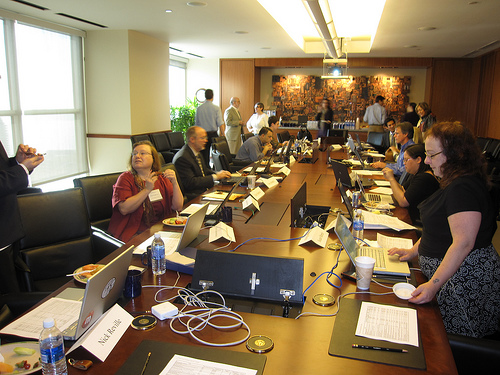
702.tv's Denise Spidle
Reading the story in the Las Vegas Sun, you could forgive a veteran local television reporter for an instinctive chuckle. Oh, aren’t they precious! The newspaper people are trying to do TV! They’ve even gone and bought themselves a red couch and a curtain for a backdrop!
Yeah, you definitely want to laugh it off. But here’s the weird thing about 702.tv: it’s interesting, it’s different, and it’s the supposedly-dead medium of print, encroaching–yet again–on TV’s turf. It’s almost like (am I crazy here?) the print people think they can win the battle for local video online. Nah. That’s crazy. We own that!
From the Washington Post, and it’s excellent series of video documentaries posted online, to The New York Times’ creative and compelling commitment to multi-media storytelling, it’s becoming clear the print folk don’t want to stay on their side of the fence in what’s obviously a deathmatch. There will be local news, of course, and it’ll probably be predominantly online at some point, but thinking that we’re the experts on video and so obviously it’s the papers that have to give up and go home… well, that’s a huge mistake.
Think about your TV newsroom. What print tricks have you adopted? Certainly you haven’t got bodies in police precincts running through the overnight arrests, and nobody’s hanging out in the courthouse checking on interesting lawsuits. That’s what newspapers are for, right?
Ah, but you’ve learned to write in print form for the web! Right? You doctor up your 6 o’clock script into a mock-print style and file it–sorry, feed it–to the website. And what a brilliant website it is, if I know anything about local TV, I’m sure yours is creative, ground-breaking, and chock full of unique uses of video. Right?
Right?
 Everybody in town isn’t coming out of this alive, folks. And assuming the print people will roll over and play dead just because, you know, the printing press is dead, well, that doesn’t seem to be working. Sure, the paper won’t be hitting doorsteps like it used to, but those print folk seem so aggressive about getting into our game. And far moreso than we seem to be about getting into theirs. Or even, about getting more creative about what we do. And that’s how companies go out of business.
Everybody in town isn’t coming out of this alive, folks. And assuming the print people will roll over and play dead just because, you know, the printing press is dead, well, that doesn’t seem to be working. Sure, the paper won’t be hitting doorsteps like it used to, but those print folk seem so aggressive about getting into our game. And far moreso than we seem to be about getting into theirs. Or even, about getting more creative about what we do. And that’s how companies go out of business.
Doing a “webcast” that’s a lousy and dated version of your noon newscast? That’s not creative. That’s not going to grab someone and say, hey, that’s different. But I wouldn’t put it past the kids in Vegas from getting that reaction. Yeah, sure, their motto is “News Never Looked So Good.” There’s that part of the equation. I get that. But there’s something else. There’s a creativity here that I haven’t seen coming from TV stations.
Take a look at the winners of the Knight Foundation’s 2009 News Challenge. No call letters among the bunch. But a LOT of creative, multi-platform, forward-thinking ideas about taking information and getting it in front of people, instead of sitting back on our broadcast bottoms and continuing to think the audience will just keep coming to us.

The Knight Foundation Voters Decide in Miami: Local TV? Not on the Table.
Eric Umansky and Scott Klein of ProPublica, and Aaron Pilhofer and Ben Koski of The New York Times won $719,500 to bankroll a project aimed at enriching investigative news reports by creating an easily searchable, free, public online database of public records. (As Jeff Jarvis would say, that’s asking “What Would Google Do?)
Gail Robinson at the Gotham Gazette won $250,000 to create an online wiki devoted to local legislators’ voting records and campaign contributions, so voters in New York can go someplace–free–and find usable information.
And in Phoenix, Aleksandra Chojnacka and Adam Klawonn of the Daily Phoenix won $95,000 to fund their idea of using news, games and social networking to help commuters on the city’s light rail system informed about their city.
Where’s the proof broadcasters get it? Where’s the creativity that shows we will endure, succeed and prosper five years from now? Skype liveshots? Anchor blogs? Weather widgets?
Folks. The Buick dealer isn’t coming back on a white horse to save you. What are you doing to change?











